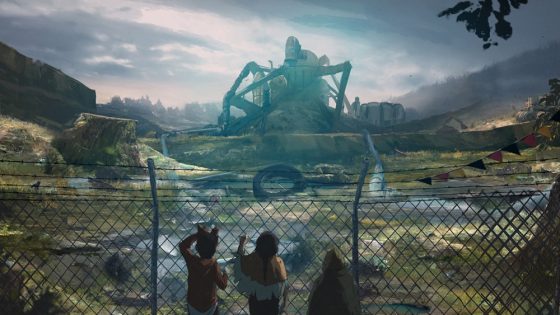ANNECY, France — José Miguel Ribeiro, Nuno Beato and David Doutel and Vasco Sá, iconic figures in modern-day Portuguese animation, will unveil new projects at this year’s Annecy. They will be joined by newer talents – Vier Nev, behind “A Mind Sang” – João Carrilho, Patrícia Figueiredo and Natália Azevedo Andrade – who together deliver an eloquent snapshot of the burgeoning state of Portuguese animation.
Over the last 30 years, Portuguese animation has won ever more prizes for usually 2D short films of dazzling beauty, experimentation and sometimes social point. The career of Regina Pessoa, who delivers a masterclass at Annecy, is a case in point.
Animation remains in Portugal a vocational passion. In one case in point, Ribeiro, after scoring praise and plaudits with feature film “Nayola,” will present a short film, “The Flower and the Fish,” which marks another new direction in vastly eclectic career.
Yet Portuguese animation is in the throes of industry take-off. That cuts several ways, but most especially in a step-up in every more ambitious feature film and TV production.
To be presented at Annecy’s 2024 MIFA Feature Films pitches, Beato’s “Speransa” takes place on a large canvas, weighing in as the story of a plucky nine-year-old girl from a “tabanka” village in sixteenth century Western Africa in what is now Guinea-Bissau, just after an enormous fort was opened in nearby Cacheu in order to facilitate the slave trade practiced by the Portuguese crown.
Sardinha em Lata, behind Beato’s “My Grandfather’s Demons” and now “Speransa,” has “The No Sleep Over,” an episode in series “Alice’s Diary,” in this year’s Annecy TV competition. In all, Sardinha has six feature films, no less, in different stages of development.
“Una,” a highlight at a Portuguese Projects Pitch on June 12, marks the feature film debut of David Doutel and Vasco Sá, producers at Portuguese creative powerhouse BAP – Animation Studios whose own shorts as directors, such as ‘Soot’ (2014), ‘Augur’ (2018) and “Garrano” (2022), have dazzled for their beauty.
With “Una,” Doutel and Sá gain increasingly urgent social point linking the rebellion of young Una against a smoke belching lithium mine in her village mountain valley to other attempts to push back against the ravages of rampant eco-destructive capitalism around the world.
Also, “from a broader perspective, the project arises from the increasingly prevalent phenomenon of eco-anxiety in youth, affecting their belief in an optimistic future,” Doutel adds.
Meanwhile, new companies and new talents emerge in Portugal. “Dark Woods,” a TV Special, is the first IP from production house Fly Moustache; “The Dance of the Fanchonos” builds on Vier Nev’s break-out success with “A Mind Sang.”
The Portuguese Projects Pitch selection is rounded up by works by two other relatively new talents: “Limbo,” directed by the Oporto-based illustrator and animator Patrícia Figueiredo, behind the 2014 animated short “Foi o fio”; and “There Might Be Nothing Here,” from Natália Azevedo Andrade, a writer-director of animated shorts “Within” (2015) and “Thorns and Fishbones” (2019).
Brief details of the projects:
MIFA Feature Film Pitch:
“Speransa,” (“Esperança,” Nuno Beato, Sardinha em Lata)
Beato’s follow-up to Annecy 2022 Contrechamp entry “My Grandfather’s Demons,” and a second feature from him which looks set to to make telling use of the counterpoint between 2D and stop motion, if first-look concept art is anything to go by. In sixteenth century west Africa, a plucky young girl, 9, sees her village attacked. Separated from her family, she is dispatched to a slave ship where she and other prisoners rebel. “As Portuguese, I feel obliged to help ensure that the heavy mark that Europe left in Africa, initiated by my ancestors, is never forgotten or undervalued. I would like the following generations to learn to look at history in a more humane and inclusive way,” Beato tells Variety.
MIFA Short Film Pitch:
“The Flower and the Fish,” (José Miguel Ribeiro)
A 2D short film adaptation of Afonso Cruz’s book marking the latest work written and directed by Ribeiro, a director behind milestones in Portuguese animation such as “The Suspect” and recent Annecy feature hit “Nayola.” Produced by Ribeiro’s label Praça Filmes, plus France’s JPL Filmes and Belgium’s S.O.I.L., “The Flower and the Fish” is “film about two children, a fish, and a flower in a canvas to explore the duality that exists in everything,” says Ribeiro. The abstract backgrounds and characters are inspired by painters Wassilly Kandinsky and Antoni Tàpies, he adds.
Portuguese Project Pitches:
“The Dance of the Fanchonos,” (“A Dança dos Fanchonos,” Vier Nev, COLA Animation)
Set to use the same slight of eye multistable perception seen in Nev’s celebrated “A Mind Sang,” “Dance” expands from the stream of consciousness narrative of that short to an animated short film about three queer people living and suffering under Salazar’s 1932-74 New State dictatorship. “Marta sees her sexuality through the frightening legend of the lesbian ghost Henriqueta. Valentim wants to escape the country and be a dancer. Zé is the victim of “arrebentas” [straight men who pretended to be gay in order to out and blackmail queer men]. Their stories contextualize the Estado Novo homophobia within a larger history of queer oppression,” says Niev. Made in 2D digital and produced by Bruno Caetano and Susana António for COLA Animation.
“Dark Woods,” (João Carrilho, Fly Moustache)
Sasha and Chewie, her loyal dog, move to the countryside. While Sasha deals with her grief and frustration, they encounter a mystical creature in the Dark Woods, pushing her to confront her fears and unlock her inner magic, the synopsis says.
A TV special written by Nuno Soler, adapting illustrator Estrela Lourenço’s book, “Dark Woods.” “Her visual style, characterized by her soft color palette and rounded lines, brings a child-like nostalgia which we wanted to convey in our film,” says production coordinator Sara Antonio. “Dark Woods encapsulates all the essential elements for a captivating kids’ narrative—magic, adventure, and comedy — while thoughtfully exploring contemporary issues such as mental health, nature protection, and the fear of the unknown,” she adds.
“Limbo,” (Patrícia Figueiredo, Animais)
An 10-minute essay on limbo made with a mix of 2D and paper-cut animation and photography, as a tongue-in-cheek narrator explores limbo. “The concept of Limbo is used in so many situations and it’s so open to interpretation. Maybe what can set this title apart is the curiosity about which Limbo the film talks about. Is it a feeling or a place? Is there someone stuck in there? Is it going to be a heavy subject or is it actually very silly?” says Figueiredo who cites the influence of Paul Driessen and Don Hertzfeldt, “two big references for me, not only visually but also because of their humor and the way they tell stories.”
“There Might Be Nothing Here,” (“Talvez Não Hana Nada Aqui,” Natália Azevedo Andrade, Aim Creative Studios)
After a shipwreck, confronted by strange outer space life, astronaut Rita becomes catatonic, and must rely on the confident Carla, very different from herself, to accomplish a mission she doesn’t understand.
“I sometimes struggle to find representation of these topics of mental health and codependency – they are often portrayed with a doom and gloom that doesn’t feel necessarily authentic to me. I wanted an approach that doesn’t glorify it, that speaks to the audience at eye level, while being uncompromising as a piece of film,” says Andrade. The short is co-written, illustrated and co-animated by Hungary’s Gábor Mariai and co-produced by Hungary’s Boddah.
“Una,” (David Doutel & Vasco Sá, BAP – Animation Studios)
After the arrival of a mining company to her small mountain village, UNA, a 9-year-old girl, decides to stage a protest with her friends. Their actions spiral out of control, and Una embarks on a journey that will change everyone’s future.
Written by Regina Guimarães, BAP – Animation Studios’ go-to screenwriter – animated in 2D digital painting and oil paintings, and a call for action from BAP in what co-writer-director David Doutel calls “a visually ambitious film about how a single action of a 9 year old girl can change the future of an entire community.”
“As children grow up in a world flooded by apocalyptical news, we are working on ‘UNA,’ feeling it can resonate as an inciting and utopian film for all the struggles we all have ahead,” he adds.
Source Agencies


